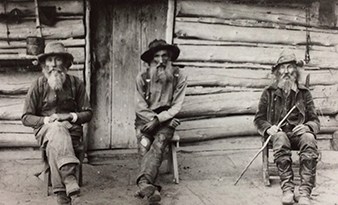


Often when I look at old photographs and read about Idaho’s early settlers, I’m surprised by their glowing descriptions of the land in its territorial and early statehood days. I anticipate journals that are besieged with stories of death, disease, and despair. They’re not. It makes me wonder, if we have it so much better than they ever did, why are we so much needier than they ever were?
Take this account from William Goulder, made in 1909, reflecting on his move in 1861 to the new gold mining camp now called Orofino. There he found “a land of almost perpetual sunshine and flowers, and among a younger generation of men, who were anxious to have bestowed upon them the title of pioneers.”
Goulder said Idaho contained “the wonder and delight of the visitor, tourist, and home-seeker, who is astonished at finding here, so far away from what he had hitherto considered the hubs and centers of enterprise and refinement, a country where nothing seemed lacking.”
My friend Bryan Smith, of Idaho Falls, sent me photos of his great, great, great, great uncles: Dave, Hardy and Tom Johnston, early settlers of Canyon County. They are photographed more than 100 years ago with their unkempt beards, tattered hats, and jeans sitting in front of a one-room log cabin they built with their own hands and lived in. Their cabin can still be seen, preserved, in one of Caldwell’s city parks.
Bryan tells me the brothers were on their way to Oregon but stopped in Caldwell when they got sick. They built their cabin next to the river. Bryan says they noticed the abundant wild game and decided to stay put. They enjoyed life. One was an accomplished dancer. All three brothers lived to about 88, Bryan said.
It is true that many of our early pioneers also describe the unforgiving nature of frontier life, where a person could (and sometimes did) freeze to death making their way short distances by foot or on horseback. Or suffer incurable (for their time) ailments that took the lives of the young and promising. Accidents, mishaps, and misfortune occurred. But the commentaries of early settlers are often upbeat, even as they encountered and endured the challenges that 19th-century frontier living had in store for them.
In reading their histories, I have yet to come across a story of a pioneer who wanted, craved, fought for, or believed that his or his family’s healthcare was the government’s concern. Some of them, were they alive today, would qualify for Medicaid expansion. Yet they didn’t describe themselves as victims or supplicants.
I can find no example of these rugged settlers lamenting their lack of health insurance, healthcare, or insisting that the government provide it, or any other services, to them. To the contrary, those are the people whose self-styled independence made our state into what it is today: strong, independent, and free. Their strength made us strong. What we do with it is now up to us.
Over the last several decades, Idaho’s unique character, found in the pluck and gravitas of its early inhabitants, has been increasingly replaced by a system of dependency. Today, about half of the births in Idaho are covered by Medicaid. The federal government provides to the state 1 out of every 3 dollars in the state budget.
While we have it better than Goulder or the Johnston brothers or any of their contemporaries could ever imagine, Idahoans today are soon to vote on an initiative that would next take able-bodied, childless adults—people no different than many of the men and women who braved the elements and tamed the West—and make them wards of the state, dependent on and reliant on government programs for their wellbeing.
Proposition 2 would stick future Idahoans—our children and children—with the bill for the cost of today’s healthcare services. What a departure for a state where yesterday’s pioneers wanted for nothing, and managed to build from nothing.
Before you vote on Proposition 2, consider where we’ve been and where we are going. Consider how we will be viewed by future generations looking back at our left-behind photographs and videos. Are we made of the same stuff as our forebears? Or is Idaho a state where even able-bodied people depend on government programs, bureaucracies, and handouts for their survival?


